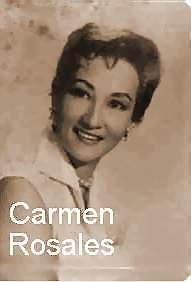Carmen Rosales
Carmen Rosales | |
|---|---|
 | |
| Born | Januaria Constantino Keller March 3, 1917 |
| Died | December 11, 1991 (aged 74) Mandaluyong, Philippines |
| Occupations | Actress |
| Years active | 1938–1965 |
Januaria Constantino Keller[1] (March 3, 1917 – December 11, 1991), better known by her stage name Carmen Rosales and by her nickname Mameng, was a noted Filipina actress and World War II guerilla fighter.[2][3]
As an actress, career spanned the decades immediately before, during, and after World War II. Her tremendous commercial success and wide fan base before the war has led to her being considered the original superstar of Philippine movies.[4] Her stage name, Carmen Rosales taken from her hometown of Carmen, Rosales, Philippines.
Early life
Januaria Constantino Keller was born in Carmen, Rosales, Pangasinan, Insular Government of the Philippine Islands of the US to Pantaleón Keller Rosles, her father who was of Swedish ethnicity and Filipina mother, Pilar Constantino y de la Cruz. Pilar Constantino y de la Cruz was born April 13, 1872, in Quingua, Bulacan, Captaincy General of the Philippines, Spanish East Indies of the Spanish Empire.
Acting career
Rosales' film debut was in the 1938 movie Mahiwagang Binibini which she played based on the Zarsuela play of Atang dela Rama "Ang Kiri". When her friend brought her to Quisumbing, he rejected the young woman for not having the bearing of an actress.[5][citation needed]
Nonetheless, Rosales became one of the most famous Filipina actresses in the 1940s and 1950s, rivalling Rosa del Rosario at the box-office. She is famous for her sweet voice and numerous recordings. Rosales made her debut in Ang Kiri (The Flirt) produced by Diwata Pictures. She starred in her first leading role opposite Jose Padilla Jr in Arimunding-Munding (1939).
She became the most bankable star in Sampaguita Pictures. In 1949, she became the highest-paid movie star when LVN Pictures offered her the unprecedented sum of P45,000 to team up again with Rogelio dela Rosa in Kampanang Ginto, followed by Camelia, then Sipag at Yaman with Jose Padilla, Jr. and Batalyon Trece with Jaime dela Rosa. Among her unforgettable roles included the spurned lover of Rogelio dela Rosa in Maalaala Mo Kaya (1954) and a club-singer in Ang Tangi Kong Pag-ibig.
She received her first Famas Award in 1954 for her role in Inspirasyon opposite Van de Leon. She was similarly awarded in 1960 for playing a strict matron in Estela Mondragon.
She garnered fame playing a hacendera in Pablo Gomez's version of MN. Her last public appearance was on Inday Badiday's Eye to Eye.
World War II guerrilla activities
Rosales' husband Ramon was killed by Japanese forces early in the Japanese Occupation of the Philippines during World War II. As a result, she decided to join a guerrilla group and fight the Japanese. She joined the Hukbong Bayan Laban sa Hapon forces, and became a sharpshooter. She was known for wearing a false mustache during guerrilla raids, in an effort to disguise herself.<ref name="star2005">
The Original Queen of Philippine Movies
Arguably, she was the Queen of Philippine Movies in the 1940s. The films in which she was top-billed aided in the popularity of emerging actresses like Gloria Romero, Amalia Fuentes and Susan Roces, who all became movie queens themselves decades later.
Death
She died on December 11, 1991 of kidney malfunction in Mandaluyong City, Philippines.[citation needed]
Legacy
A barrio in Rosales, Pangasinan was named after her. It is now currently divided into two barangays, Carmen East and Carmen West.
Filmography
- 1939 -Mahiwagang Binibini
- 1939 -Arimunding-Arimunding
- 1939 -Takip-Silim
- 1940 -Senorita
- 1940 -Lambingan
- 1940 -Diwa ng Awit
- 1940 -Colegiala
- 1941 -Carmen
- 1941 -Princesita
- 1941 -Panambitan
- 1941 -Tampuhan
- 1941 -Palikero
- 1941 -Lolita
- 1944 -Liwayway ng Kalayaan
- 1946 -Probinsiyana
- 1946 -Guerilyera
- 1947 -Kaaway ng Bayan
- 1947 -Si, Si...Senorito
- 1947 -Mameng...Iniibig Kita
- 1947 -Ang Kamay ng Diyos
- 1947 -Hele-hele bago Quiere
- 1947 -24 na Pag-ibig
- 1948 -Ang Selosa
- 1948 -Hindi Kita Malimot
- 1949 -Kampanang Ginto
- 1949 -Carmencita Mia
- 1949 -Simpatika
- 1949 -Camelia
- 1949 -Sipag ay Yaman
- 1949 -Batalyon XIII
- 1950 -Ang Bombero
- 1950 -Ang Magpapawid
- 1951 -Nanay ko!
- 1951 -Anak ko!
- 1951 -Babae...Babae at Babae Pa
- 1951 -Huling Concierto
- 1951 -Walang Kapantay
- 1953 -Rosa Villa
- 1953 -May Umaga Pang Darating
- 1953 -Inspirasyon -{Famas Best Actress}
- 1954 -Maala-Ala Mo?
- 1954 -Matandang Dalaga
- 1954 -MN
- 1954 -Luha ng Birhen
- 1955 -Ang Tangi kong Pag-ibig
- 1955 -Uhaw sa Pag-ibig
- 1955 -R.O.T.C.
- 1955 -Iyung-Iyo
References
- ^ "RP showbiz aglow with 'Tisoy,' 'Tisay'". Manila Bulletin. 2010-04-26. Retrieved 2010-05-12.
- ^ Acosta, Zofiya; Bulan, Amirielle Anne (2019-03-08). "Women in Philippine history you should know about". NOLISOLI. Hinge Inquirer Group. Archived from the original on 2019-10-02. Retrieved 2019-10-02.
- ^ Maceda, Marichu (March 6, 2005). "Carmen Rosales: The Genuine Superstar". The Philippine Star. Archived from the original on 2018-12-13. Retrieved 2019-10-02.
- ^ Llanes, Rommel R (September 4, 2009). "The Originals in Philippine movies". Philippine Entertainment Portal.
- ^ "Film # 007773053 Image Film # 007773053; ark:/61903/3:1:3Q9M-CSMN-8GDB — FamilySearch.org". Retrieved April 24, 2016.
